- Gender-Focused Studies of Preliminary STEM Program
 By: Elizabeth Moraff A notable opportunity emerged from our efforts to deconstruct research addressing the presence of women in STEM subjects and their ability to persist in these fields. Specifically, our examination focused on studies of women involved in STEM at higher education levels. Our review revealed consistent themes related to experienced … Continue reading “Gender-Focused Studies of Preliminary STEM Program”
By: Elizabeth Moraff A notable opportunity emerged from our efforts to deconstruct research addressing the presence of women in STEM subjects and their ability to persist in these fields. Specifically, our examination focused on studies of women involved in STEM at higher education levels. Our review revealed consistent themes related to experienced … Continue reading “Gender-Focused Studies of Preliminary STEM Program” - Career Paths in Stem for African American Women
 By: Yendi Neil Career paths in STEM (Science, Technology, Engineering, and Mathematics) are growing in the modern world, but women’s representation within these jobs is not experiencing the same amount of growth. A literature review was conducted on previous studies ranging from the early 2000s to now about women representation in STEM … Continue reading “Career Paths in Stem for African American Women”
By: Yendi Neil Career paths in STEM (Science, Technology, Engineering, and Mathematics) are growing in the modern world, but women’s representation within these jobs is not experiencing the same amount of growth. A literature review was conducted on previous studies ranging from the early 2000s to now about women representation in STEM … Continue reading “Career Paths in Stem for African American Women” - In Their Own Voices: Workers with Concealable Disabilities
 Work Science Center Network members Deborah Rupp and Lisa Finkelstein noticed a gap in the literature around workers with disabilities. While studies had oft examined outcomes of people with stigmatized identities, including those with disabilities, they did not find much research featuring the voices of workers with disabilities. To remedy this gap, … Continue reading “In Their Own Voices: Workers with Concealable Disabilities”
Work Science Center Network members Deborah Rupp and Lisa Finkelstein noticed a gap in the literature around workers with disabilities. While studies had oft examined outcomes of people with stigmatized identities, including those with disabilities, they did not find much research featuring the voices of workers with disabilities. To remedy this gap, … Continue reading “In Their Own Voices: Workers with Concealable Disabilities” - Network Research Highlight: Assessment Center Differences – What’s the Cause?
 Work Science Center Network member, Deborah Rupp, teamed up with other scientists to probe the causes of group-level differences in the way people were rated during the Assessment Center Method. The Assessment Center has been long viewed as an objective means of measuring performance. It involves standardized evaluation of behavior based on … Continue reading “Network Research Highlight: Assessment Center Differences – What’s the Cause?”
Work Science Center Network member, Deborah Rupp, teamed up with other scientists to probe the causes of group-level differences in the way people were rated during the Assessment Center Method. The Assessment Center has been long viewed as an objective means of measuring performance. It involves standardized evaluation of behavior based on … Continue reading “Network Research Highlight: Assessment Center Differences – What’s the Cause?” - Network Research Highlight: Measuring Hospitality
 Work Science Center Network Member, Kostadin Kushlev, and a team of co-researchers noticed something strange in psychological literature: where were the studies on hospitality? As they combed through indices of flourishing, instruments for well-being, they found staggeringly little attention paid to this universal and cross-cutting phenomenon. Despite the fact that all people … Continue reading “Network Research Highlight: Measuring Hospitality”
Work Science Center Network Member, Kostadin Kushlev, and a team of co-researchers noticed something strange in psychological literature: where were the studies on hospitality? As they combed through indices of flourishing, instruments for well-being, they found staggeringly little attention paid to this universal and cross-cutting phenomenon. Despite the fact that all people … Continue reading “Network Research Highlight: Measuring Hospitality” - Network Research Highlight: Batch Your Smartphone Notifications
 By: Keaton Fletcher Work Science Center Network member, Kostadin Kushlev, recently set out to find the answer with other researchers. In his recent publication, Kushlev and the other researchers conducted a field test to see how changing the intervals of smartphone notifications would affect worker productivity and well being. To do so, … Continue reading “Network Research Highlight: Batch Your Smartphone Notifications”
By: Keaton Fletcher Work Science Center Network member, Kostadin Kushlev, recently set out to find the answer with other researchers. In his recent publication, Kushlev and the other researchers conducted a field test to see how changing the intervals of smartphone notifications would affect worker productivity and well being. To do so, … Continue reading “Network Research Highlight: Batch Your Smartphone Notifications” - Eldercare and Workers
 By: Keaton Fletcher Research Hole: Workers Caring for Elders Work Science Center Network Member Boris Baltes teamed up with four other researches to put out a plea: help fill the knowledge gap about workers caring for elders. These five scientists dedicated a year to soliciting original research about employees providing eldercare. As … Continue reading “Eldercare and Workers”
By: Keaton Fletcher Research Hole: Workers Caring for Elders Work Science Center Network Member Boris Baltes teamed up with four other researches to put out a plea: help fill the knowledge gap about workers caring for elders. These five scientists dedicated a year to soliciting original research about employees providing eldercare. As … Continue reading “Eldercare and Workers” - How to Use LinkedIn for Hiring
 By: Keaton Fletcher Social Media, specifically LinkedIn, has played an increasingly important role in connecting job seekers with employers and recruiters. In an article recently published in Personnel Psychology, Roulin and Levashina (2019) presented data from two studies exploring how LinkedIn is, and can be, used as a selection tool. As a … Continue reading “How to Use LinkedIn for Hiring”
By: Keaton Fletcher Social Media, specifically LinkedIn, has played an increasingly important role in connecting job seekers with employers and recruiters. In an article recently published in Personnel Psychology, Roulin and Levashina (2019) presented data from two studies exploring how LinkedIn is, and can be, used as a selection tool. As a … Continue reading “How to Use LinkedIn for Hiring” - Network Research Highlight: Outcomes of Negative Age Stereotypes
 By: Keaton Fletcher Meta-stereotypes are those that we think other people hold against a group. So an age meta-stereotype is what you think other people think about your age group. These stereotypes can be positive or negative. Work Science Center Network Member, Lisa Finkelstein, led a team of researchers, including fellow WSC … Continue reading “Network Research Highlight: Outcomes of Negative Age Stereotypes”
By: Keaton Fletcher Meta-stereotypes are those that we think other people hold against a group. So an age meta-stereotype is what you think other people think about your age group. These stereotypes can be positive or negative. Work Science Center Network Member, Lisa Finkelstein, led a team of researchers, including fellow WSC … Continue reading “Network Research Highlight: Outcomes of Negative Age Stereotypes” - WSC Network Research Highlight: Measuring Team Processes
 By: Keaton Fletcher Working with other people in a team requires an entirely new set of behaviors than working in isolation. WSC Network Member, Margaret Luciano, along with a team of researchers, led by John Mathieu, recently published a paper in Organizational Research Methods, about these behaviors. Specifically, teams researchers have relied on a framework … Continue reading “WSC Network Research Highlight: Measuring Team Processes”
By: Keaton Fletcher Working with other people in a team requires an entirely new set of behaviors than working in isolation. WSC Network Member, Margaret Luciano, along with a team of researchers, led by John Mathieu, recently published a paper in Organizational Research Methods, about these behaviors. Specifically, teams researchers have relied on a framework … Continue reading “WSC Network Research Highlight: Measuring Team Processes” - Supervisors Helping Veterans Transition to Civilian Jobs
 By: Keaton Fletcher Transitioning from active military duty to civilian jobs can be particularly challenging, but relatively little empirical work has been done to explore this period. A recent paper published in the Journal of Applied Psychology (Hammer, Wan, Brockwood, Bodner & Mohr, 2019) examines how supportive behaviors from a supervisor can … Continue reading “Supervisors Helping Veterans Transition to Civilian Jobs”
By: Keaton Fletcher Transitioning from active military duty to civilian jobs can be particularly challenging, but relatively little empirical work has been done to explore this period. A recent paper published in the Journal of Applied Psychology (Hammer, Wan, Brockwood, Bodner & Mohr, 2019) examines how supportive behaviors from a supervisor can … Continue reading “Supervisors Helping Veterans Transition to Civilian Jobs” - WSC Network Research Highlight: Encouraging Whistleblowing
 By: Elizabeth Moraff Work Science Center Network Member, Darell Burell, and a team of researchers recently published a paper investigating factors impacting whistleblowing in police departments. The research team identified a series of allegations of police misconduct and the nationwide increase in such complaints. The article notes that police face particular stressors in their role, … Continue reading “WSC Network Research Highlight: Encouraging Whistleblowing”
By: Elizabeth Moraff Work Science Center Network Member, Darell Burell, and a team of researchers recently published a paper investigating factors impacting whistleblowing in police departments. The research team identified a series of allegations of police misconduct and the nationwide increase in such complaints. The article notes that police face particular stressors in their role, … Continue reading “WSC Network Research Highlight: Encouraging Whistleblowing” - Fighting for Your Team
 By: Yendi Neil Teams in organizations often provide more advantages than individuals working independently when overcoming a new challenge, but their success relies on the coordination and interpersonal relations of the team. A universal negative influence on teamwork is relationship conflict (i.e., interpersonal tensions based not on disagreements about the task, but … Continue reading “Fighting for Your Team”
By: Yendi Neil Teams in organizations often provide more advantages than individuals working independently when overcoming a new challenge, but their success relies on the coordination and interpersonal relations of the team. A universal negative influence on teamwork is relationship conflict (i.e., interpersonal tensions based not on disagreements about the task, but … Continue reading “Fighting for Your Team” - Race Matters in Pay Negotiations
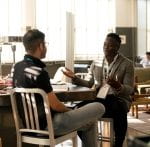 By: Keaton Fletcher Within the United States, there exists a racial pay gap, such that a college-educated Black man can expect to earn about 80% of what a college-educated White man will earn, on average (Pew Research Center, 2016). A recent paper published in the Journal of Applied Psychology (Hernandez, Avery, Volpone, … Continue reading “Race Matters in Pay Negotiations”
By: Keaton Fletcher Within the United States, there exists a racial pay gap, such that a college-educated Black man can expect to earn about 80% of what a college-educated White man will earn, on average (Pew Research Center, 2016). A recent paper published in the Journal of Applied Psychology (Hernandez, Avery, Volpone, … Continue reading “Race Matters in Pay Negotiations” - WSC Network Research Highlight: The Social Price of Smartphones
 By: Keaton Fletcher Smartphones have become pervasive. Work Science Center Network Member, Kostadin Kushlev, recently published a review on the social costs of smartphone usage. Smartphones are designed to capture our attention, and increased use has been shown to increase perceived distraction and negative mood while decreasing feelings of social connectedness, meaning, and enjoyment. … Continue reading “WSC Network Research Highlight: The Social Price of Smartphones”
By: Keaton Fletcher Smartphones have become pervasive. Work Science Center Network Member, Kostadin Kushlev, recently published a review on the social costs of smartphone usage. Smartphones are designed to capture our attention, and increased use has been shown to increase perceived distraction and negative mood while decreasing feelings of social connectedness, meaning, and enjoyment. … Continue reading “WSC Network Research Highlight: The Social Price of Smartphones” - Motivated to Procrastinate
 By: Yendi Neil From time to time, everyone engages in procrastination, or delaying completing necessary tasks. In the short-term, procrastination can have benefits in protecting one’s self-esteem but can negatively impact one’s performance in the long run. In general, people who have higher fears of failure are more likely to procrastinate, but … Continue reading “Motivated to Procrastinate”
By: Yendi Neil From time to time, everyone engages in procrastination, or delaying completing necessary tasks. In the short-term, procrastination can have benefits in protecting one’s self-esteem but can negatively impact one’s performance in the long run. In general, people who have higher fears of failure are more likely to procrastinate, but … Continue reading “Motivated to Procrastinate” - WSC Network Research Highlight: Heavy Drinking with Clients
 By: Keaton Fletcher Heavy drinking (consumption of 5 or more standard alcoholic beverages in one sitting) with clients is a common occurrence, but can be problematic, both for employees as well as their employer. A study recently published in Human Relations by a team of researchers including Work Science Center Network Member, Mo Wang, and … Continue reading “WSC Network Research Highlight: Heavy Drinking with Clients”
By: Keaton Fletcher Heavy drinking (consumption of 5 or more standard alcoholic beverages in one sitting) with clients is a common occurrence, but can be problematic, both for employees as well as their employer. A study recently published in Human Relations by a team of researchers including Work Science Center Network Member, Mo Wang, and … Continue reading “WSC Network Research Highlight: Heavy Drinking with Clients” - WSC Network Research Highlight: Job Insecurity and Satisfaction
 By: Keaton Fletcher In the modern workforce, many workers worry about the security of their employment, and this may have negative outcomes for them and their organizations. A team of researchers led by Work Science Center Network Member, Mindy Shoss, published the results of three studies on this topic in a recent … Continue reading “WSC Network Research Highlight: Job Insecurity and Satisfaction”
By: Keaton Fletcher In the modern workforce, many workers worry about the security of their employment, and this may have negative outcomes for them and their organizations. A team of researchers led by Work Science Center Network Member, Mindy Shoss, published the results of three studies on this topic in a recent … Continue reading “WSC Network Research Highlight: Job Insecurity and Satisfaction” - Conversation Content and Women in STEM
 By: Jacqueline Jung It is no secret that women are underrepresented in academia, especially in science, technology, engineering, and math (STEM) disciplines. When scanning the names of a faculty roster for STEM departments, it is not uncommon to find just one or two female faculty members. For women, this imbalance negatively impacts … Continue reading “Conversation Content and Women in STEM”
By: Jacqueline Jung It is no secret that women are underrepresented in academia, especially in science, technology, engineering, and math (STEM) disciplines. When scanning the names of a faculty roster for STEM departments, it is not uncommon to find just one or two female faculty members. For women, this imbalance negatively impacts … Continue reading “Conversation Content and Women in STEM” - WSC Network Research Highlight: Disclosing Disability Status
 By: Keaton Fletcher The Americans with Disabilities Act of 1990 defines disability as a physical or mental impairment that substantially limits a major life activity such as hearing, seeing, speaking, walking, breathing, performing manual tasks, caring for oneself, learning, or working. Most employers are required to provide reasonable accommodations for their employees … Continue reading “WSC Network Research Highlight: Disclosing Disability Status”
By: Keaton Fletcher The Americans with Disabilities Act of 1990 defines disability as a physical or mental impairment that substantially limits a major life activity such as hearing, seeing, speaking, walking, breathing, performing manual tasks, caring for oneself, learning, or working. Most employers are required to provide reasonable accommodations for their employees … Continue reading “WSC Network Research Highlight: Disclosing Disability Status” - Gender Differences in University Administrators’ Perspectives on Policies for Women in STEM
 By: Yendi Neil University administrators manage the policies and activities of the university, guiding the organization in strategic directions. For example, administrators can influence the population of the university faculty by allocating resources and power to affect representation. Williams and colleagues (2017) surveyed 1,529 administrators across 96 public and private universities in … Continue reading “Gender Differences in University Administrators’ Perspectives on Policies for Women in STEM”
By: Yendi Neil University administrators manage the policies and activities of the university, guiding the organization in strategic directions. For example, administrators can influence the population of the university faculty by allocating resources and power to affect representation. Williams and colleagues (2017) surveyed 1,529 administrators across 96 public and private universities in … Continue reading “Gender Differences in University Administrators’ Perspectives on Policies for Women in STEM” - Where Are All the Women Scientists?
 By: Jacqueline Jung For decades, historians have delved into historical records to dismantle the stereotype that only men have made significant contributions and advancements to science, technology, engineering and technology. Margaret Rossiter’s Women Scientists in America, published in 1982, was a landmark biography that focused on women who contributed to the growth … Continue reading “Where Are All the Women Scientists?”
By: Jacqueline Jung For decades, historians have delved into historical records to dismantle the stereotype that only men have made significant contributions and advancements to science, technology, engineering and technology. Margaret Rossiter’s Women Scientists in America, published in 1982, was a landmark biography that focused on women who contributed to the growth … Continue reading “Where Are All the Women Scientists?” - Network Research Highlight: Respect Leads to Voice
 By: Elizabeth Moraff Ever been encouraged to speak up? Work Science Center Network Member Sharon K. Parker recently published a study with Thomas Ng and Dennis Hsu in the Journal of Management that investigates some factors that influence why an employee may speak up or not. Parker and her collaborators looked at … Continue reading “Network Research Highlight: Respect Leads to Voice”
By: Elizabeth Moraff Ever been encouraged to speak up? Work Science Center Network Member Sharon K. Parker recently published a study with Thomas Ng and Dennis Hsu in the Journal of Management that investigates some factors that influence why an employee may speak up or not. Parker and her collaborators looked at … Continue reading “Network Research Highlight: Respect Leads to Voice” - Mapping Signs of Trust in Robots
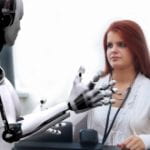 By: Cathy Liu Advancements in automation in the workplace have created opportunities for increased collaboration between humans and machines. A recent article on Axios about human trust towards robots emphasized the importance of “calibrating a human’s trust to a machine’s capability.” Humans must find the right balance with how much trust they place in machines. In … Continue reading “Mapping Signs of Trust in Robots”
By: Cathy Liu Advancements in automation in the workplace have created opportunities for increased collaboration between humans and machines. A recent article on Axios about human trust towards robots emphasized the importance of “calibrating a human’s trust to a machine’s capability.” Humans must find the right balance with how much trust they place in machines. In … Continue reading “Mapping Signs of Trust in Robots” - Network Research Highlight: Motivation, Exhaustion, and Behavior
 By: Keaton Fletcher In a recent paper, WSC Network Member, Mo Wang, along with a team of researchers led by Jaclyn Koopmann studied the relationship between what typically motivates us and our behavior at work. Specifically, using a sample of Chinese nurses, the research team found that people who have more of a promotion focus … Continue reading “Network Research Highlight: Motivation, Exhaustion, and Behavior”
By: Keaton Fletcher In a recent paper, WSC Network Member, Mo Wang, along with a team of researchers led by Jaclyn Koopmann studied the relationship between what typically motivates us and our behavior at work. Specifically, using a sample of Chinese nurses, the research team found that people who have more of a promotion focus … Continue reading “Network Research Highlight: Motivation, Exhaustion, and Behavior” - Robot-Assisted Surgeries: Technology Changing Team Dynamics
 By: Pooja Juvekar & Keaton Fletcher The introduction of new technology to the workplace can influence the way employees complete their tasks, including how they coordinate with one another. A case study published in the International Journal of Social Robotics (Cunningham, et al., 2013) observed four surgical procedures using the da Vinci surgical system … Continue reading “Robot-Assisted Surgeries: Technology Changing Team Dynamics”
By: Pooja Juvekar & Keaton Fletcher The introduction of new technology to the workplace can influence the way employees complete their tasks, including how they coordinate with one another. A case study published in the International Journal of Social Robotics (Cunningham, et al., 2013) observed four surgical procedures using the da Vinci surgical system … Continue reading “Robot-Assisted Surgeries: Technology Changing Team Dynamics” - Network Research Highlight: General or Specific Mental Abilities
 By: Keaton Fletcher Work Science Center Advisory Council Member, Margaret Beier, recently published a commentary for a special issue of the Journal of Intelligence on the nature of mental ability. Research has supported a hierarchical structure of intelligence such that there is one general mental ability, that is related to more specific cognitive abilities. … Continue reading “Network Research Highlight: General or Specific Mental Abilities”
By: Keaton Fletcher Work Science Center Advisory Council Member, Margaret Beier, recently published a commentary for a special issue of the Journal of Intelligence on the nature of mental ability. Research has supported a hierarchical structure of intelligence such that there is one general mental ability, that is related to more specific cognitive abilities. … Continue reading “Network Research Highlight: General or Specific Mental Abilities” - Technology and Emotions
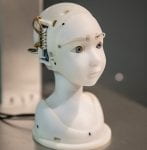 By: Keaton Fletcher As the role of technology in the workplace increases, we have to continue to examine what the role of humans is, and will be. One quality of humanity that sets us apart from technology (so far) is the ability to feel, express, and share in emotions. Three recent examples … Continue reading “Technology and Emotions”
By: Keaton Fletcher As the role of technology in the workplace increases, we have to continue to examine what the role of humans is, and will be. One quality of humanity that sets us apart from technology (so far) is the ability to feel, express, and share in emotions. Three recent examples … Continue reading “Technology and Emotions” - Network Research Highlight: The Future of the Psychology of Working
 By: Elizabeth Moraff Work Science Center advisory council member David Blustein recently published a paper detailing the Psychology of Working Framework (PWF) and its corresponding theory, Psychology of Working Theory (PWT). These intertwined concepts identify the fundamental needs that work fulfills for humans, such as economic survival, social connections, and self-determination (Blustein, … Continue reading “Network Research Highlight: The Future of the Psychology of Working”
By: Elizabeth Moraff Work Science Center advisory council member David Blustein recently published a paper detailing the Psychology of Working Framework (PWF) and its corresponding theory, Psychology of Working Theory (PWT). These intertwined concepts identify the fundamental needs that work fulfills for humans, such as economic survival, social connections, and self-determination (Blustein, … Continue reading “Network Research Highlight: The Future of the Psychology of Working” - Minimum Wage 101
 By: Keaton Fletcher The U.S. federal minimum wage is currently $7.25 per hour, a standard that was set in 2009. The minimum wage for work covered by federal contracts, however, is $10.35 per hour. 29 of the 50 states have a minimum wage higher than the federal minimum, ranging from $7.50 (New … Continue reading “Minimum Wage 101”
By: Keaton Fletcher The U.S. federal minimum wage is currently $7.25 per hour, a standard that was set in 2009. The minimum wage for work covered by federal contracts, however, is $10.35 per hour. 29 of the 50 states have a minimum wage higher than the federal minimum, ranging from $7.50 (New … Continue reading “Minimum Wage 101” - Network Research Highlight: Selecting Fairly
 By: Keaton Fletcher A paper recently published in the International Journal of Selection and Assessment by a team of researchers including WSC Advisory Council Member, Deborah Rupp, focuses on an increasingly popular tool that organizations are using to select individuals for hiring or promotion, assessment centers. Assessment centers require participants to engage … Continue reading “Network Research Highlight: Selecting Fairly”
By: Keaton Fletcher A paper recently published in the International Journal of Selection and Assessment by a team of researchers including WSC Advisory Council Member, Deborah Rupp, focuses on an increasingly popular tool that organizations are using to select individuals for hiring or promotion, assessment centers. Assessment centers require participants to engage … Continue reading “Network Research Highlight: Selecting Fairly” - Demographics of Science and Engineering: Are We Improving?
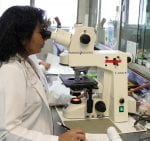 By: Yendi Neil According to a report released by the National Science Foundation (NSF; 2017), the enrollment of historically underrepresented groups (e.g., women, Blacks, Hispanics, Native Americans, Alaska Natives, and individuals with disabilities) in undergraduate institutions is increasing. However, enrollment trends differ across demographic groups. Hispanics, Native Hawaiians or Pacific Islanders, and … Continue reading “Demographics of Science and Engineering: Are We Improving?”
By: Yendi Neil According to a report released by the National Science Foundation (NSF; 2017), the enrollment of historically underrepresented groups (e.g., women, Blacks, Hispanics, Native Americans, Alaska Natives, and individuals with disabilities) in undergraduate institutions is increasing. However, enrollment trends differ across demographic groups. Hispanics, Native Hawaiians or Pacific Islanders, and … Continue reading “Demographics of Science and Engineering: Are We Improving?” - Network Research Highlight: Work-Family Conflict is a Barrier for Women
 By: Elizabeth Moraff Work Science Center network member Mary F. Fox has focused much of her research on women in research and academia, particularly noting barriers to their advancement. Most recently, she published a reflection on Georgia Tech’s website detailing the insights present research has provided on the way work-family conflict (when … Continue reading “Network Research Highlight: Work-Family Conflict is a Barrier for Women”
By: Elizabeth Moraff Work Science Center network member Mary F. Fox has focused much of her research on women in research and academia, particularly noting barriers to their advancement. Most recently, she published a reflection on Georgia Tech’s website detailing the insights present research has provided on the way work-family conflict (when … Continue reading “Network Research Highlight: Work-Family Conflict is a Barrier for Women” - Who Quits STEM Majors?
 By Jacqueline Jung The modern workforce is becoming increasingly science and technology based. Improving the selection and retention of undergraduate students in STEM (Science, Technology, Engineering, and Math) majors is, therefore, increasingly important. Attrition rates are high: more than 1 in 4 students leave college before completing their degree, and it is … Continue reading “Who Quits STEM Majors?”
By Jacqueline Jung The modern workforce is becoming increasingly science and technology based. Improving the selection and retention of undergraduate students in STEM (Science, Technology, Engineering, and Math) majors is, therefore, increasingly important. Attrition rates are high: more than 1 in 4 students leave college before completing their degree, and it is … Continue reading “Who Quits STEM Majors?” - Network Research Highlight: Work is More Than a Paycheck
 By: Keaton Fletcher WSC Advisory Board Member, David Blustein, is part of a team led by Kelsey L. Autin that recently published a paper in the Journal of Counseling Psychology that tackles what it means to have your needs satisfied by your work. The authors point toward decent work as a method … Continue reading “Network Research Highlight: Work is More Than a Paycheck”
By: Keaton Fletcher WSC Advisory Board Member, David Blustein, is part of a team led by Kelsey L. Autin that recently published a paper in the Journal of Counseling Psychology that tackles what it means to have your needs satisfied by your work. The authors point toward decent work as a method … Continue reading “Network Research Highlight: Work is More Than a Paycheck” - Lack of Sleep is a Public Health and Economic Concern
 By: Riley Swab Sleep is necessary to increase focus and productivity, both vital traits to workers. Japanese workers, however, are accumulating massive sleep debts (i.e., consistently sleeping less than 7 hours per night without rebound sleep such as naps or sleeping in) due to a prevalent mentality that sacrificing sleep means you … Continue reading “Lack of Sleep is a Public Health and Economic Concern”
By: Riley Swab Sleep is necessary to increase focus and productivity, both vital traits to workers. Japanese workers, however, are accumulating massive sleep debts (i.e., consistently sleeping less than 7 hours per night without rebound sleep such as naps or sleeping in) due to a prevalent mentality that sacrificing sleep means you … Continue reading “Lack of Sleep is a Public Health and Economic Concern” - Network Research Highlight: Cyber-Vetting May Be Limiting Talent Pools
 By: Elizabeth Moraff & Keaton Fletcher A recent paper published by Debora Jeske, Sonia Lippke, and Work Science Center Network Member, Kenneth Shultz, in the Employee Responsibilities and Rights Journal, highlights the increasingly confusing role of social media in job selection. Cyber-vetting is a process in which employers screen potential employees based … Continue reading “Network Research Highlight: Cyber-Vetting May Be Limiting Talent Pools”
By: Elizabeth Moraff & Keaton Fletcher A recent paper published by Debora Jeske, Sonia Lippke, and Work Science Center Network Member, Kenneth Shultz, in the Employee Responsibilities and Rights Journal, highlights the increasingly confusing role of social media in job selection. Cyber-vetting is a process in which employers screen potential employees based … Continue reading “Network Research Highlight: Cyber-Vetting May Be Limiting Talent Pools” - Building a Bridge from Fulltime Work to Retirement
 By: Riley Swab Although older workers contribute valuable ideas, knowledge, and experience to the workforce, these can often be overshadowed by their potential loss in innovative ideas and physical abilities (Zacher, Kooij, & Beier, 2018). A solution to this cost-benefit analysis may be bridge employment, which is a type of partial retirement … Continue reading “Building a Bridge from Fulltime Work to Retirement”
By: Riley Swab Although older workers contribute valuable ideas, knowledge, and experience to the workforce, these can often be overshadowed by their potential loss in innovative ideas and physical abilities (Zacher, Kooij, & Beier, 2018). A solution to this cost-benefit analysis may be bridge employment, which is a type of partial retirement … Continue reading “Building a Bridge from Fulltime Work to Retirement” - Network Research Highlight: Creating Enriched Jobs
 By: Elizabeth Moraff An enriched work design is one in which work roles provide employees with autonomy, task variety, and opportunities to use and develop skills. Despite a wealth of literature pointing towards the benefits of enriched work design, low-quality and poorly-designed jobs continue to pervade the global workspace (Parker, Andrei, & … Continue reading “Network Research Highlight: Creating Enriched Jobs”
By: Elizabeth Moraff An enriched work design is one in which work roles provide employees with autonomy, task variety, and opportunities to use and develop skills. Despite a wealth of literature pointing towards the benefits of enriched work design, low-quality and poorly-designed jobs continue to pervade the global workspace (Parker, Andrei, & … Continue reading “Network Research Highlight: Creating Enriched Jobs” - Healthcare Goes High-Tech
 By: Catherine Liu Modern healthcare organizations are adapting and innovating in response to the boom in artificial intelligence. A recent paper details two distinct branches of use for artificial intelligence in healthcare: virtual and physical. The virtual branch encompasses the use of deep learning in information management, management of electronic health records, and guidance of … Continue reading “Healthcare Goes High-Tech”
By: Catherine Liu Modern healthcare organizations are adapting and innovating in response to the boom in artificial intelligence. A recent paper details two distinct branches of use for artificial intelligence in healthcare: virtual and physical. The virtual branch encompasses the use of deep learning in information management, management of electronic health records, and guidance of … Continue reading “Healthcare Goes High-Tech” - Network Research Highlight: Vocational Interests and Fit
 By: Keaton Fletcher Members of the Work Science Center Advisory Council, Tara Behrend and David Blustein, recently published a groundbreaking study, led by Alexander Glosenberg, in the Journal of Vocational Behavior exploring the fit between individuals’ vocational interests and their current careers across the globe. Vocational interests are essentially common aspects of jobs … Continue reading “Network Research Highlight: Vocational Interests and Fit”
By: Keaton Fletcher Members of the Work Science Center Advisory Council, Tara Behrend and David Blustein, recently published a groundbreaking study, led by Alexander Glosenberg, in the Journal of Vocational Behavior exploring the fit between individuals’ vocational interests and their current careers across the globe. Vocational interests are essentially common aspects of jobs … Continue reading “Network Research Highlight: Vocational Interests and Fit” - The Science Behind Uber’s Nudges
 By: Brian Hengesbaugh Behavioral science has long been used by media and advertisers to influence the decision-making of consumers (e.g., pricing items at 99 cents instead of the full dollar). The growing “gig economy,” in which temporary jobs are completed by independent contractors instead of full-time employees, has led employers to look … Continue reading “The Science Behind Uber’s Nudges”
By: Brian Hengesbaugh Behavioral science has long been used by media and advertisers to influence the decision-making of consumers (e.g., pricing items at 99 cents instead of the full dollar). The growing “gig economy,” in which temporary jobs are completed by independent contractors instead of full-time employees, has led employers to look … Continue reading “The Science Behind Uber’s Nudges” - Network Research Highlight: Understanding Empathy with Malissa Clark
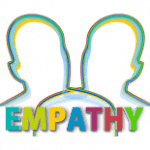 By: Keaton Fletcher In a recent review accepted for publication in the Journal of Organizational Behavior, Dr. Malissa Clark (Work Science Center Network Member) and colleagues provide a clearer understanding of the nature and role of empathy in the workplace. Empathy is a complex phenomenon with affective (e.g., experiencing others’ emotions), behavioral (e.g., demonstrating … Continue reading “Network Research Highlight: Understanding Empathy with Malissa Clark”
By: Keaton Fletcher In a recent review accepted for publication in the Journal of Organizational Behavior, Dr. Malissa Clark (Work Science Center Network Member) and colleagues provide a clearer understanding of the nature and role of empathy in the workplace. Empathy is a complex phenomenon with affective (e.g., experiencing others’ emotions), behavioral (e.g., demonstrating … Continue reading “Network Research Highlight: Understanding Empathy with Malissa Clark” - Millennial cyberloafing: Why it’s costly & how to approach the problem
 By: Jacqueline Jung With access to technology and the internet nearly ubiquitous in the modern workforce, organizations are struggling with a relatively new phenomenon: cyberloafing. Cyberloafing is the use of technology at work for non-work-related purposes (e.g., checking social media, watching YouTube videos). Cyberloafing may reduce productivity and has been estimated to … Continue reading “Millennial cyberloafing: Why it’s costly & how to approach the problem”
By: Jacqueline Jung With access to technology and the internet nearly ubiquitous in the modern workforce, organizations are struggling with a relatively new phenomenon: cyberloafing. Cyberloafing is the use of technology at work for non-work-related purposes (e.g., checking social media, watching YouTube videos). Cyberloafing may reduce productivity and has been estimated to … Continue reading “Millennial cyberloafing: Why it’s costly & how to approach the problem” - Network Research Highlight: Leveraging the Benefits of an Aging Workforce
 By: Riley Swab Rising populations coupled with increased life expectancies have left industrialized nations to deal with a new issue in the workforce. In fact, the U.S. Census Bureau has estimated that by 2035 people over the age of 65 will outnumber children under age 18. As more people live to older ages, they … Continue reading “Network Research Highlight: Leveraging the Benefits of an Aging Workforce”
By: Riley Swab Rising populations coupled with increased life expectancies have left industrialized nations to deal with a new issue in the workforce. In fact, the U.S. Census Bureau has estimated that by 2035 people over the age of 65 will outnumber children under age 18. As more people live to older ages, they … Continue reading “Network Research Highlight: Leveraging the Benefits of an Aging Workforce” - What is Agile? A New Technique Companies Are Using to Stay Competitive
 By: Catherine Liu With advances in technology increasing, the need for rapid adaptation and adjustment, many companies, particularly those in the technology sector, have turned toward Agile as a potential solution. In a 2011 study of over 200 IT and business executives, it was found that Agile had a positive, significant correlation with firm performance. Agile … Continue reading “What is Agile? A New Technique Companies Are Using to Stay Competitive”
By: Catherine Liu With advances in technology increasing, the need for rapid adaptation and adjustment, many companies, particularly those in the technology sector, have turned toward Agile as a potential solution. In a 2011 study of over 200 IT and business executives, it was found that Agile had a positive, significant correlation with firm performance. Agile … Continue reading “What is Agile? A New Technique Companies Are Using to Stay Competitive” - Designing the Face of Tomorrow’s Corporate Boards: Gender Diversity and Default Decisions
 By Brian Hengesbaugh Why aren’t there more women on corporate boards? Women constitute 47% of the labor force and 52% of management and professional positions (Bureau of Labor Statistics, 2017). Yet women comprise just 21% of corporate board seats (Catalyst, 2018). This dearth of women on corporate boards exists despite what appear to … Continue reading “Designing the Face of Tomorrow’s Corporate Boards: Gender Diversity and Default Decisions”
By Brian Hengesbaugh Why aren’t there more women on corporate boards? Women constitute 47% of the labor force and 52% of management and professional positions (Bureau of Labor Statistics, 2017). Yet women comprise just 21% of corporate board seats (Catalyst, 2018). This dearth of women on corporate boards exists despite what appear to … Continue reading “Designing the Face of Tomorrow’s Corporate Boards: Gender Diversity and Default Decisions” - What is the Ideal Robot Teammate’s Personality?
 By: Keaton Fletcher What kind of robot would you want for a teammate? A recent theoretical paper argued that robot personality will influence individuals’ and teams’ motivation. To better understand robot personality, we must first briefly describe personality traits in humans. The most widely accepted model of human personality captures an individual’s general tendencies … Continue reading “What is the Ideal Robot Teammate’s Personality?”
By: Keaton Fletcher What kind of robot would you want for a teammate? A recent theoretical paper argued that robot personality will influence individuals’ and teams’ motivation. To better understand robot personality, we must first briefly describe personality traits in humans. The most widely accepted model of human personality captures an individual’s general tendencies … Continue reading “What is the Ideal Robot Teammate’s Personality?” - Bringing an Ethic of Care to Organizations
 By: Hannah Ramil The Ethic of Care (EoC) rests upon the belief that “an awareness of the connection between people gives rise to a recognition of responsibility for one another, a perception of the need for response” (Gilligan, 1982). In essence, the EoC perspective emphasizes the importance of interpersonal relationships and the … Continue reading “Bringing an Ethic of Care to Organizations”
By: Hannah Ramil The Ethic of Care (EoC) rests upon the belief that “an awareness of the connection between people gives rise to a recognition of responsibility for one another, a perception of the need for response” (Gilligan, 1982). In essence, the EoC perspective emphasizes the importance of interpersonal relationships and the … Continue reading “Bringing an Ethic of Care to Organizations” - Automating Fashion
 By: Xinyu Chu Although automation and robotics has long impacted manufacturing jobs, with recent technological advances, even more traditional office jobs are feeling the change. A New York Times article by Noam Schieber discusses the role automation is playing in the fashion industry. For example, the tasks of a fashion buyer, which typically require … Continue reading “Automating Fashion”
By: Xinyu Chu Although automation and robotics has long impacted manufacturing jobs, with recent technological advances, even more traditional office jobs are feeling the change. A New York Times article by Noam Schieber discusses the role automation is playing in the fashion industry. For example, the tasks of a fashion buyer, which typically require … Continue reading “Automating Fashion” - Primed for Success
 By: Brian Hengesbaugh How can we enhance goal setting and increase performance? Prime the mind with effort. Priming is the process of using a stimulus to subconsciously activate stored knowledge and psychological processes. As an example, if you were to read the following sentence “The fire truck ran through the intersection, ignoring the … Continue reading “Primed for Success”
By: Brian Hengesbaugh How can we enhance goal setting and increase performance? Prime the mind with effort. Priming is the process of using a stimulus to subconsciously activate stored knowledge and psychological processes. As an example, if you were to read the following sentence “The fire truck ran through the intersection, ignoring the … Continue reading “Primed for Success” - Nudging Retirement Savings Among Older Workers
 By: Brian Hengesbaugh It is never too late to save for retirement. With the Baby Boomer generation rapidly approaching retirement age, it is imperative to promote healthy retirement planning. Although we know that saving for retirement is important, voluntary retirement savings plans are often underutilized. Changing saving habits can be challenging – … Continue reading “Nudging Retirement Savings Among Older Workers”
By: Brian Hengesbaugh It is never too late to save for retirement. With the Baby Boomer generation rapidly approaching retirement age, it is imperative to promote healthy retirement planning. Although we know that saving for retirement is important, voluntary retirement savings plans are often underutilized. Changing saving habits can be challenging – … Continue reading “Nudging Retirement Savings Among Older Workers” - Emotions During Employment Gaps
 By: Haleigh Streak In the modern economy, with the rise of automation and gig work, employment gaps are common. These gaps may be voluntary (i.e. caretaking for new children or aging parents/grandparents, spouse relocation, etc.), or involuntary (i.e. downsizing and termination). No matter the nature, employment gaps signify considerable interruptions in career … Continue reading “Emotions During Employment Gaps”
By: Haleigh Streak In the modern economy, with the rise of automation and gig work, employment gaps are common. These gaps may be voluntary (i.e. caretaking for new children or aging parents/grandparents, spouse relocation, etc.), or involuntary (i.e. downsizing and termination). No matter the nature, employment gaps signify considerable interruptions in career … Continue reading “Emotions During Employment Gaps” - Did You Google It? Enterprise Social Media Enhances Autonomous Learning
 By: Keaton Fletcher It has become expected by both employers and employees that jobs will require continued learning over the course of one’s career; enterprise social media is one method that companies can use to facilitate learning. According to a conference paper published by Carine Touré, Christine Michel, and Jean-Charles Marty, enterprise social media is essentially … Continue reading “Did You Google It? Enterprise Social Media Enhances Autonomous Learning”
By: Keaton Fletcher It has become expected by both employers and employees that jobs will require continued learning over the course of one’s career; enterprise social media is one method that companies can use to facilitate learning. According to a conference paper published by Carine Touré, Christine Michel, and Jean-Charles Marty, enterprise social media is essentially … Continue reading “Did You Google It? Enterprise Social Media Enhances Autonomous Learning” - Is Your Leader Giving You The Freedom You Need?
 By: Keaton Fletcher Findings from a recently published meta-analysis (a method of combining the findings from many different smaller studies) by Gavin Slemp, Margaret Kern, Kent Patrick, and Richard Ryan suggest that good leaders support your autonomy in the workplace. Leadership has long been a useful tool for organizations to motivate and manage the workforce. Perspectives on leadership have … Continue reading “Is Your Leader Giving You The Freedom You Need?”
By: Keaton Fletcher Findings from a recently published meta-analysis (a method of combining the findings from many different smaller studies) by Gavin Slemp, Margaret Kern, Kent Patrick, and Richard Ryan suggest that good leaders support your autonomy in the workplace. Leadership has long been a useful tool for organizations to motivate and manage the workforce. Perspectives on leadership have … Continue reading “Is Your Leader Giving You The Freedom You Need?” - Network Research Highlight: Are You Successfully Aging at Work?
 By: Keaton Fletcher A recent book chapter by Cort Rudolph and Hannes Zacher highlights the complex and dynamic process of aging in the workplace. Unlike many previous conceptualizations of aging at work, Rudolph and Zacher bring attention to the fact that development occurs across the lifespan, not just during youth. Work is increasingly becoming designed to promote continuous learning. … Continue reading “Network Research Highlight: Are You Successfully Aging at Work?”
By: Keaton Fletcher A recent book chapter by Cort Rudolph and Hannes Zacher highlights the complex and dynamic process of aging in the workplace. Unlike many previous conceptualizations of aging at work, Rudolph and Zacher bring attention to the fact that development occurs across the lifespan, not just during youth. Work is increasingly becoming designed to promote continuous learning. … Continue reading “Network Research Highlight: Are You Successfully Aging at Work?” - Network Research Highlight: The Benefits of Decent Work
 By: Keaton Fletcher Although most people groan and take a bit longer getting ready for work Monday mornings, lamenting the short weekend, David Blustein, Jonas Masdonati, and Jérôme Rossier, suggest maybe we should count our blessings instead since work is a key component of the human condition. In a recent report, Blustein and colleagues highlight the … Continue reading “Network Research Highlight: The Benefits of Decent Work”
By: Keaton Fletcher Although most people groan and take a bit longer getting ready for work Monday mornings, lamenting the short weekend, David Blustein, Jonas Masdonati, and Jérôme Rossier, suggest maybe we should count our blessings instead since work is a key component of the human condition. In a recent report, Blustein and colleagues highlight the … Continue reading “Network Research Highlight: The Benefits of Decent Work” - Reading the IT Leaves: NSF’s ITEST Program & the Future of Work
 By: Keaton Fletcher Technology is clearly changing the entire workforce, but how can workers change to keep up? To help this massive transition, The National Science Foundation sponsored ITEST (Innovative Technology Experiences for Students and Teachers). ITEST works to connect students from prekindergarten through 12th grade with professionals in STEM (science, technology, engineering, and math) … Continue reading “Reading the IT Leaves: NSF’s ITEST Program & the Future of Work”
By: Keaton Fletcher Technology is clearly changing the entire workforce, but how can workers change to keep up? To help this massive transition, The National Science Foundation sponsored ITEST (Innovative Technology Experiences for Students and Teachers). ITEST works to connect students from prekindergarten through 12th grade with professionals in STEM (science, technology, engineering, and math) … Continue reading “Reading the IT Leaves: NSF’s ITEST Program & the Future of Work” - After Automation: Will There Be Enough Jobs?
 By: Keaton Fletcher Will your job be replaced by a robot? A report by McKinsey Global Institute suggests probably not. Most people in the workforce today have, like those before them, wondered whether they will be replaced by new technology. The concern is so great, that Time Magazine released an article and an associated widget that tells you … Continue reading “After Automation: Will There Be Enough Jobs?”
By: Keaton Fletcher Will your job be replaced by a robot? A report by McKinsey Global Institute suggests probably not. Most people in the workforce today have, like those before them, wondered whether they will be replaced by new technology. The concern is so great, that Time Magazine released an article and an associated widget that tells you … Continue reading “After Automation: Will There Be Enough Jobs?” - Humans: Predictably Irrational
 By: Keaton Fletcher Humans are predictably irrational, and organizations can capitalize upon this fact to enhance the working experience as well as their own profits. In a recent podcast, Tim Dickson, on behalf of McKinsey & Company, hosted Julia Sperling, Anna Güntner, and Magdalena Smith to talk about a variety of ways organizations … Continue reading “Humans: Predictably Irrational”
By: Keaton Fletcher Humans are predictably irrational, and organizations can capitalize upon this fact to enhance the working experience as well as their own profits. In a recent podcast, Tim Dickson, on behalf of McKinsey & Company, hosted Julia Sperling, Anna Güntner, and Magdalena Smith to talk about a variety of ways organizations … Continue reading “Humans: Predictably Irrational” - Network Research Highlight: Corporate Social Responsibility and Organizational Justice
 By: Keaton Fletcher Our very own advisory council member, Dr. Deborah E. Rupp recently published two papers on related topics: corporate social responsibility and organizational justice. In collaboration with Omer Farooq and Mariam Farooq, Rupp tackles the issue of corporate social responsibility (CSR). CSR is the notion that an organization has a moral obligation to provide benefits and positive outcomes to … Continue reading “Network Research Highlight: Corporate Social Responsibility and Organizational Justice”
By: Keaton Fletcher Our very own advisory council member, Dr. Deborah E. Rupp recently published two papers on related topics: corporate social responsibility and organizational justice. In collaboration with Omer Farooq and Mariam Farooq, Rupp tackles the issue of corporate social responsibility (CSR). CSR is the notion that an organization has a moral obligation to provide benefits and positive outcomes to … Continue reading “Network Research Highlight: Corporate Social Responsibility and Organizational Justice” - Is Work Killing People?
 By: Keaton Fletcher In a recent interview, Jeffrey Pfeffer author of Dying for a Paycheck, paints a dark picture of the modern workforce that boils down to four words: work is killing people. In his book and subsequent interview, Pfeffer echoes Robert Chapman’s argument that work is the source of stress, and stress causes chronic disease … Continue reading “Is Work Killing People?”
By: Keaton Fletcher In a recent interview, Jeffrey Pfeffer author of Dying for a Paycheck, paints a dark picture of the modern workforce that boils down to four words: work is killing people. In his book and subsequent interview, Pfeffer echoes Robert Chapman’s argument that work is the source of stress, and stress causes chronic disease … Continue reading “Is Work Killing People?” - Should You Try to Balance Family and Work?
 By: Keaton Fletcher One thing most working adults struggle with is balancing the demands of work and family. Oftentimes we find ourselves needing to be in two places at once, or thinking about work when we should be focusing on what our partner is saying, or treating our employees like our children. … Continue reading “Should You Try to Balance Family and Work?”
By: Keaton Fletcher One thing most working adults struggle with is balancing the demands of work and family. Oftentimes we find ourselves needing to be in two places at once, or thinking about work when we should be focusing on what our partner is saying, or treating our employees like our children. … Continue reading “Should You Try to Balance Family and Work?” - Science Fiction in Work: New Technologies in the Workplace
 By: Keaton Fletcher In a recent article, CNN highlighted seven ways in which technological advances are potentially changing the way we work. For example, humans are generally pretty terrible at cybersecurity. Many companies have started to use biometric authentication (e.g., iris scanning, fingerprint scanning, or facial recognition) to provide workers access to computer … Continue reading “Science Fiction in Work: New Technologies in the Workplace”
By: Keaton Fletcher In a recent article, CNN highlighted seven ways in which technological advances are potentially changing the way we work. For example, humans are generally pretty terrible at cybersecurity. Many companies have started to use biometric authentication (e.g., iris scanning, fingerprint scanning, or facial recognition) to provide workers access to computer … Continue reading “Science Fiction in Work: New Technologies in the Workplace” - Back to the Future: How Current Technological Changes Are Nothing New
 By: Keaton Fletcher In a recent podcast, Peter Grumble of Mckinsey Global Institute spoke with Susan Lund (a partner at McKinsey) and Richard Cooper, Maurits C. Boas Professor of International Economics at Harvard University, about the concerns regarding the changes advances in technology may bring about in the workforce. To answer this question, Lund and Cooper look … Continue reading “Back to the Future: How Current Technological Changes Are Nothing New”
By: Keaton Fletcher In a recent podcast, Peter Grumble of Mckinsey Global Institute spoke with Susan Lund (a partner at McKinsey) and Richard Cooper, Maurits C. Boas Professor of International Economics at Harvard University, about the concerns regarding the changes advances in technology may bring about in the workforce. To answer this question, Lund and Cooper look … Continue reading “Back to the Future: How Current Technological Changes Are Nothing New” - Welcome to the new GT Work Science Center!
 Our decision to launch this Center came after years of discussion with colleagues about limitations of the performance-centric orientation and the relatively insular perspectives often used by scientists who study work and organizational behavior. Scientific and methodological advances across psychology and other disciplines underscore the importance of understanding work in terms of multilevel … Continue reading “Welcome to the new GT Work Science Center!”
Our decision to launch this Center came after years of discussion with colleagues about limitations of the performance-centric orientation and the relatively insular perspectives often used by scientists who study work and organizational behavior. Scientific and methodological advances across psychology and other disciplines underscore the importance of understanding work in terms of multilevel … Continue reading “Welcome to the new GT Work Science Center!”
Now in main content
